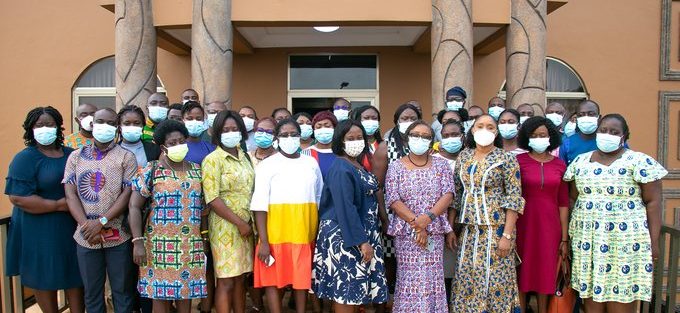Sexual exploitation, abuse and sexual harassment have no place in the United Nations (UN) and the global development community at large. Any kind of sexual misconduct violates human rights and is a betrayal of the core values of the United Nations.
As the UN agency responsible for sexual and reproductive health, UNFPA is committed to preventing sexual misconduct by anyone including programme implementers and will promptly act upon any such abuse when it occurs as well as assist those affected by it.
To ensure that programme Implementing Partners (IPs); who interact regularly with beneficiaries and communities do not fall foul of standards on Sexual Abuse and Exploitation, UNFPA brought together IP focal points from all the sixteen (16) regions of Ghana to train them on the UN Standards on Preventing Sexual Exploitation and Abuse (PSEA).
Welcoming participants, to the two-day training in Kumasi, the Regional Coordinating Director of the Ashanti Region Ms. Emelia Botchway, expressed appreciation to UNFPA for deeming it necessary to train staff of the of the Ashanti Regional Coordinating Council (ARCC) and other partners on issues of sexual harassment and abuse. She said continuous in-service training is high on governments agenda to keep staff abreast with current happenings hence her appreciation. The UNFPA training will equip staff to be well informed on such a sensitive but everyday occurrence issues. “We have an opportunity to join forces to make a greater impact to protect our citizenry from sexual exploitation, abuse and harassment” she concluded.
Participating IPs in the training included all Regional Coordinating Councils (RCCs), the Ministry of Health, Ghana Health Service, Ministry of Gender, Children and Social Protection, NGOs namely, Hope for Future Generations (HFFG), the Planned Parenthood Association of Ghana (PPAG), Alliance for Reproductive Health and Rights (ARHR) among others.
Participants were taken through sessions in understanding PSEA, knowing the complaint mechanisms, gender stereotyping, the UNFPA policy on Prevention and Protection from Sexual Exploitation and Abuse, Serving with Pride, UN Protocol on Allegations of Sexual Exploitation and Abuse Involving Implementing Partners.
Key takeaways from the training included the agreement to identify PSEA focal points in each of the IPs agencies; an understanding of how culture and gender relations perpetuate sexual exploitation/abuse/harassment, as well as, identifying reporting as a tool for minimizing and eliminating sexual exploitation, abuse and harassment on the field and in the office.
Participants took the examination on the UN course on PSEA and had a generated certificate once they obtained a pass mark from the exams.
Source: UNFPA Website



